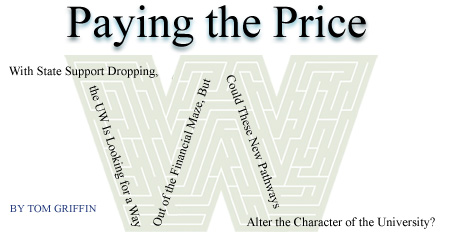
As the first public university established on the West Coast (we beat Cal by seven years), the University of Washington has always been a creature of the state of Washington. Without the political and financial support of the 1861 territorial legislature, the UW would not exist-at least not in its Seattle birthplace.
But it also took the skills of Seattle entrepreneurs to make the University of Washington happen. Businessmen like Daniel Bagley lobbied hard to locate a university in their tiny village on Elliott Bay. The Denny, Terry and Lander families donated the land for the first campus (a tradition of giving that lives on today). And the citizens of Seattle put their own "sweat equity" into the nascent university. "All who had not regular employment elsewhere went to work," Bagley wrote years later. "Nothing was too laborious or too humble for them." In only seven months, three buildings rose out of cleared land.
The character of that university has changed since 1861. In the beginning it was more of a regional high school than a university. But since then it has grown into one of the leading public research universities in the nation.

"We are really on the ropes." - Provost Lee Huntsman.
Photo by Mary Levin
Today, the character of the UW may be changing again. There is a national trend among state governments to invest less in higher education, and Washington is not immune to this new malady. Currently only 16 percent of the UW's operating budget comes from state coffers, a number that has been shrinking since the 1970s.
While not giving up on more state funding, President Richard L. McCormick, regents, administrators and faculty leaders are finding themselves in a place similar to the citizens of Seattle in 1861. If they want a thriving university, they are going to have to use some of their own sweat equity to make it happen.
Borrowing ideas from private universities and "hybrid" public institutions, UW officials talk of an "entrepreneurial public university," a place where the UW competes with others for research grants, private gifts, tuition revenue, royalties and license fees, and other sources of income.
It is a hybrid system that already exists at other public universities, such as the University of Michigan and the University of Virginia. Like the UW, these top schools have thriving research programs and private endowments; but unlike the UW, they have high undergraduate tuition and more out-of-state students. Michigan, for example, charges $6,935 for in-state undergraduates and $21,645 for out-of-state students. Comparable numbers at the UW are $4,167 and $14,868.
"Michigan decided in the 1970s that the state wouldn't support a first-tier university, so it set out to build one by itself," says James J. Duderstadt, the former president of the University of Michigan.
But some warn that a shift to an entrepreneurial university is a move toward "privatization." Chemical Engineering Professor Bradley Holt, the chair of the Faculty Senate, warns, "If students are paying $9,000 a year in tuition and faculty are having to raise their own salaries with research grants, it's not going to be the same institution that it was."
Urban Planning Professor Richard Ludwig, this year's faculty spokesperson in Olympia, warned the Faculty Senate in April that as students pay more of the cost of their education, we will become more of "a private university than a public university."
President McCormick disagrees. "I am a firm believer in public higher education," he says. "We have an obligation to afford the opportunities and benefits of a higher education to as many citizens as possible.
"We have a deep commitment to the health and welfare of this state. It is part of our charter and part of our culture," he adds.
Provost Lee Huntsman, the UW's chief budget and academic officer, also rejects the privatization label. "We are a public institution owned by the citizens and dedicated to public values. However, our finances have been shifting to some of the characteristics of private universities. We have to find a suitable path through that maze."
- Page 2: Gloomy Times and New Ideas
- Page 3: Is College Pretty Cheap?
- Page 4: A Quiet Corner of the University
- Page 5: Looking to the Future
- Sidebar: Ups & Downs: Futures in UW Funding
- Return to September 2002 Table of Contents